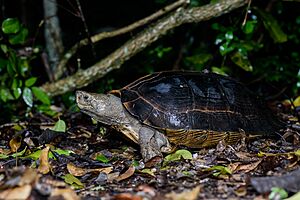Giant Asian pond turtle facts for kids
Quick facts for kids Giant Asian pond turtle |
|
|---|---|
 |
|
| Kaeng Krachan District, Phetchaburi, Thailand | |
| Conservation status | |
| Scientific classification | |
| Genus: |
Heosemys
|
| Species: |
grandis
|
| Synonyms | |
|
|
The giant Asian pond turtle (Heosemys grandis) is a large turtle found in many parts of Asia. These turtles live in rivers, streams, marshes, and even rice paddies. You can find them from low-lying areas near the coast up to about 400 meters high. They live across Cambodia and Vietnam, and also in parts of Laos, Malaysia, Myanmar, and Thailand.
Contents
Meet the Giant Asian Pond Turtle
Giant Asian pond turtles have shells that can be brown or black. Their top shell, called the carapace, often has a clear ridge down the middle. The bottom shell, known as the plastron, is usually yellow. Their heads are typically gray or brown. While most look similar, there can be small differences in their colors.
Where Do Giant Asian Pond Turtles Live?
These amazing turtles can live both in water and on land. You can spot them near many types of water bodies. This includes lakes, ponds, rivers, streams, and canals. They are very adaptable to their surroundings.
What Do Giant Asian Pond Turtles Eat?
The giant Asian pond turtle is an omnivorous animal. This means they eat both plants and other animals. They find their food in both water and on land. Their diet includes worms, insect larvae, snails, and even animals that have already died. They also enjoy eating different kinds of aquatic and land plants. Like many turtles, they have special ways to catch their food in both environments.
Why Are These Turtles in Danger?
Sadly, the giant Asian pond turtle faces serious threats. One big problem is that people illegally catch and sell them. These turtles are often sold for food in some parts of Asia. Sometimes, they are also sold as pets. Another threat is the loss of their natural homes. Their habitats are being changed into farmland, which means less space for these turtles to live.
Gallery








